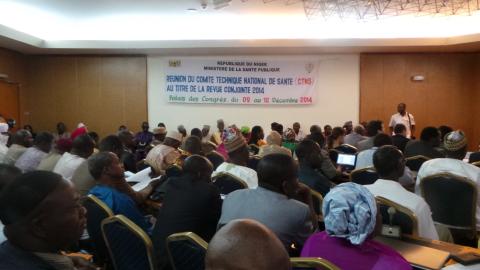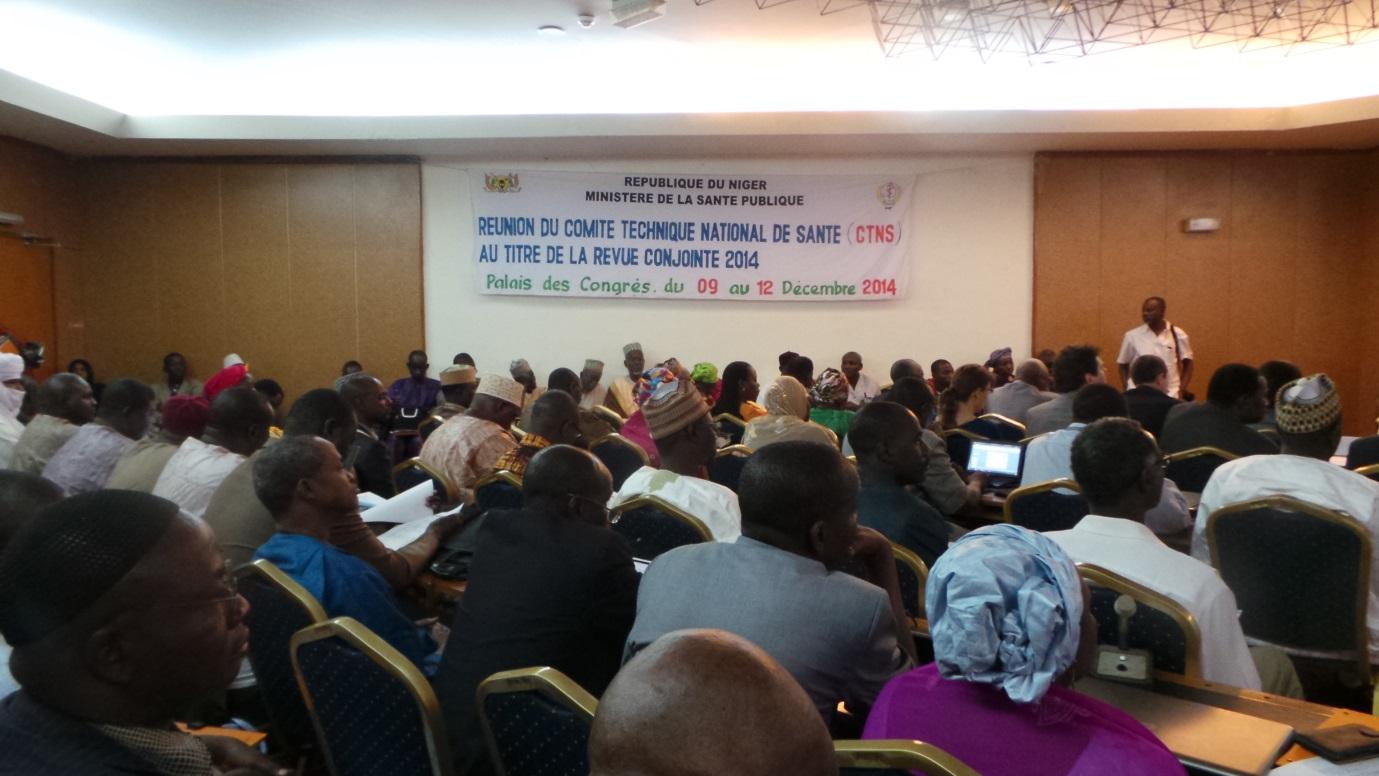
On Thursday, October 22, 2015, the Ministry of Public Health (MoH) in Niger has validated the country’s new national health policy (PNS) for its forthcoming adoption by the Council of Ministers. Niger has thus taken an important step towards the goal of better health for all. What can Nigeriens expect from this new strategy document? What are the lessons learned from the past that should be taken into account to ensure better service delivery in future?
To answer these questions, and upon request from the MoH, WHO has provided international expertise to support the technical working group set up by the MSP for the evaluation and updating of the current PNS in recent months. This expertise was provided as part of the EU-LUX-WHO partnership. The working group includes representatives from the MoH, the Ministry of Planning, the Ministry of Economy and Finance, technical and financial partners as well as civil society.
WHO also played a leading role in the evaluation process: Under the administrative and logistical coordination of the MOH, WHO was in charge of coordinating the entire process of evaluation and updating of the PNS. This role involved defining the methodology, dividing up responsibilities between different partners as well as collecting and analyzing data and the drafting assessment reports sections.
It remains to be seen what were the fruits of the effective collaboration between on the one hand the different national actors (MoH, other ministries, civil society), and, on the other hand, WHO and other development partners – in of other words: what were the main findings of the assessment and how they were incorporated into the text of the new PNS.
First, the evaluation report approved by the Steering Committee, recognized many of the advances made in recent years by Niger in the health sector, particularly as regards the reduction of child mortality and prevalence HIV / AIDS, stopping the circulation of wild poliovirus and the eradication of Guinea worm.
However, many remaining challenges were highlighted: According to the report, little progress had been made on most of the topics identified as priorities in the development of the PNS in 2002. This is the case of health coverage that remained stationary, inadequate health financing and human resources issues,(RHS) which still raise the same level of concern as in 2002 – including the lack of qualified health personnel, the inequitable distribution of human resources and the politicization of Human resources management. Very little progress has been achieved in the field of maternal health. The lack of data available on the fight against non-communicable diseases is evidence for the fact that it is not yet sufficiently organized in the country.
The main recommendations emerging from the exercise thus aim at addressing these challenges through the following strategies:
1. Re-insert in the new PNS, the priorities of the policy under evaluation on which the results were insufficient.
2. Affirm the country’s commitment to the planned Primary Health Care (person-centered health care) reforms.
3. Make universal coverage a development priority in the new PNS. This should be done on the basis of lessons learnt in the sector (free-of charge services, social security fund, health insurance, mutual health insurance, etc.).
4. Mobilize more internal (15% of the state budget and 8% of local authorities) and external resources for health during the implementation of the new PNS.
5. Establish an effective multi sectoral health policy dialogue to promote health in all policies. Take into account the issues of demographic transition, epidemiological transition, the nutrition transition, climate change and security problems the country faces when implementing the PNS.
6. Take into account the issues of demographic transition, epidemiological transition, the nutrition transition, climate change and security problems the country faces in the PNS.
7. Take into account relevant themes in the new PNS that emerged during the implementation of the PNS sub-evaluation (universal health coverage, the redistribution of health districts with over 500 000 inhabitants, etc.).
8. Establish a relevant organizational structure in relation to the implementation of the new PNS on the one hand, and as a planning tool for the management of human resources for health, on the other hand.
9. Recapitalize the National Office of Pharmaceutical Products and Medical Supplies and improve its internal management to enable it to fulfill its tasks.
10. Favouring as multi-sectoral approach in addressing human resource issues for health.
These recommendations have been duly taken into account in the finalization of the new PNS.
A major step to be taken during the months following the publication of the new PNS will be its implementation through the development of the Health Development Plan (PDS), which will cover a period of 5 or 10 years. The PDS will be budgeted and on this basis, a medium-term sector expenditure framework will be developed for a period of 3 years.
However, a key challenge to overcome in this context is that the current proportion of the state budget allocated to health is only about 6.8% (2014). It reached the ceiling of 9.98% during the implementation of the PNS, however, never reached the 15% recommended by the Abuja Declaration. The increase in financial resources for health, which includes the establishment of innovative financing for health, are part of the development areas included in the new PNS.
The role of the partnership will be two-fold in the implementation of the new PNS. The primary role is strategic and the second is technical. The strategic role will be to strengthen the dynamics of multi-sectoral and effective political dialogue including other sectors such as the Ministry of Economy and Finance, the Ministry for Decentralisation, the Ministry in charge of water and the environment, the Ministry of Civil Service and Employment, the private sector, civil society organizations, technical and financial partners. This dialogue will create the conditions to put into practice the principles of health in all policies. This is all the more important as the assessment of the PNS has shown that if a significant impact on the health of the population is to be reached, the health sector cannot act alone.
WHO’s technical role is to support the MOH and its partners in the implementation, monitoring and evaluation of the PNS. This includes strategic planning (development of health development plans) and operational planning (medium term sector expenditure frameworks, operational action plans, monitoring and evaluation frameworks and the organization of sectoral annual reviews).
The role of civil society will be strengthened through the establishment of policy dialogue groups at all levels of the health system. This monitoring role will be concretized through ensuring the participation of civil society in health service management bodies at district level (Hospital Management Committee District and Integrated Health Centres (CSI).
Strengthening the partnership between the MoH and the private health sector is one of the reforms envisaged in the new PNS. The institutional audit of the MoH undertaken in April 2015 revealed that the private sector is very dynamic in the provision of health services at the country level, but collaboration between the public and the private sector is very low. The goal now is to explore how the private sector can help increase health coverage and improve the offer health care services at all levels of the health system.
